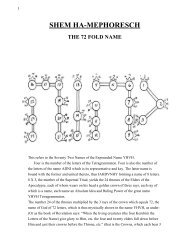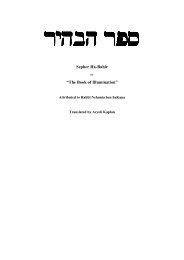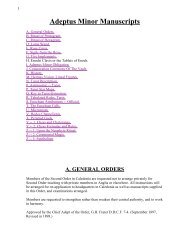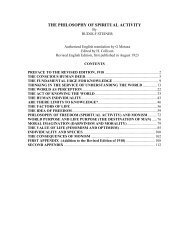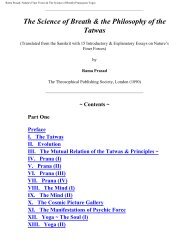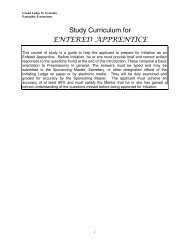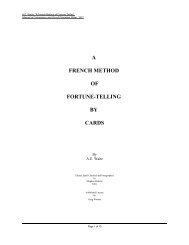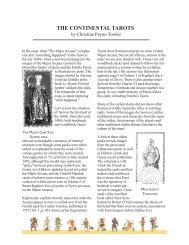Band 2 Anthropogenesis - H.P. Blavatsky
Band 2 Anthropogenesis - H.P. Blavatsky
Band 2 Anthropogenesis - H.P. Blavatsky
You also want an ePaper? Increase the reach of your titles
YUMPU automatically turns print PDFs into web optimized ePapers that Google loves.
------------------------------------------------------------------------<br />
[[Vol. 2, Page 673]] THE MEANING OF SOUL WITH HAECKEL.<br />
which is omnipresent, eternal, indestructible, is a force and a PRINCIPLE as noumenon, atoms, as phenomenon. It is one<br />
and the same thing, and cannot be considered as separate except in materialism.*<br />
Further, Haeckel enunciates concerning the Atom Souls that which, at first sight, appears as occult as a Monad of<br />
Leibnitz. "The recent contest as to the nature of atoms, which we must regard as in some form or other the ultimate<br />
factors in all physical and chemical processes," he tells us -- "seems to be capable of the easiest settlement, by the<br />
conception that these very minute masses possess, as centres of force, a persistent soul, that every atom has sensation<br />
and the power of movement."<br />
He does not say a word concerning the fact that this is Leibnitz's theory, and one pre-eminently occult. Nor does he<br />
understand the term "Soul" as we do; for, with Haeckel it is simply, along with consciousness, the production of the grey<br />
matter of the brain, a thing which, as the "cell-soul, is as indissolubly bound up with the protoplasmic body as is the<br />
human soul with the brain and spinal cord." (Ibid.) He rejects the conclusions of Kant, Herbert Spencer, of du Bois-<br />
Reymond and Tyndall. The latter expresses the opinion of all the great men of science, as of the greatest thinkers of this<br />
and the past ages, in saying that "the passage from the physics of the brain to the corresponding facts of Consciousness<br />
is unthinkable. Were our minds and senses so . . . illuminated as to enable us to see and feel the very molecules of the<br />
brain; were we capable of following all their motions, all their groupings . . . electric discharges . . . we should be as far as<br />
ever from the solution of the problem . . . The chasm between the two classes of Phenomena would still remain<br />
intellectually impassable." But the complex function of the nerve-cells of the great German EMPIRIC, or, in other words,<br />
his Consciousness, will not permit him to follow the conclusions of the greatest thinkers of our globe. He is greater than<br />
they. He asserts this, and protests against all. "No one has the right<br />
[[Footnote(s)]] -------------------------------------------------<br />
* In "The Transmigration of the Life-Atoms," we say, to explain better a position which is but too often misunderstood:-- "It<br />
is omnipresent . . . . though (on this plane of manifestation) often in a dormant state -- as in stone. The definition which<br />
states that when this indestructible force is disconnected with one set of atoms (molecules ought to have been said) it<br />
becomes immediately attracted by others, does not imply that it entirely abandons the first set (because the atoms<br />
themselves would then disappear), but only that it transfers its vis viva, or life power -- the energy of motion, to another<br />
set. But because it manifests itself in the next set as what is called Kinetic energy, it does not follow that the first set is<br />
deprived of it altogether; for it is still in it, as potential energy or life latent," etc., etc. Now what can Haeckel mean by his<br />
"not identical atoms but their peculiar motion and mode of aggregation," if it is not the same Kinetic energy we have been<br />
explaining? He must have read Paracelsus and studied "Five Years of Theosophy," without properly digesting the<br />
teachings, before evolving such theories.<br />
------------------------------------------------------------------------<br />
[[Vol. 2, Page]] 674 THE SECRET DOCTRINE.<br />
to hold that in the future we (Haeckel) shall not be able to pass beyond those limits of our knowledge that to day seem<br />
impassable"; and he quotes from Darwin's introduction to the "Descent of Man" these words, which he modestly applies<br />
to his scientific opponents and himself: "It is always those who know little, and not those who know much, that positively<br />
affirm that this or that problem will never be solved by Science."<br />
The world may rest satisfied. That day is not far off when the "thrice great" Haeckel will have shown (to his own<br />
satisfaction) that the consciousness of Sir I. Newton was, physiologically speaking, but the reflex action (or minus<br />
consciousness) caused by the peri-genesis of the plastidules of our common ancestor and old friend, the Moneron<br />
Haeckelii. The fact that the said "Bathybius" has been found out and exposed as a pretender simulating the organic<br />
substance it was not; and since, among the children of men, Lot's wife alone (and even this, only after her disagreeable<br />
metamorphosis into a salt pillar) could claim the pinch of salt it is, as her forefather -- will not dismay him at all. He will go<br />
on asserting, as coolly as he has always done, that it was no more than the peculiar mode and motion of the ghost of the<br />
long-vanished atoms of our "Father Bathybius," which, transmitted across aeons of time into the cell-tissue of the grey<br />
matter of the brains of every great man, caused Sophocles and AEschylus, as well as Shakespeare, to write their<br />
tragedies, Newton, his "Principia," Humboldt, his "Cosmos," etc. etc. It prompted Haeckel to invent Graeco-Latin names<br />
three inches long, pretending to mean a good deal, and meaning -- nothing.<br />
Of course we are quite aware that the true, honest evolutionist agrees with us; and that he is the first to say that not only<br />
is the geological record imperfect, but that there are enormous gaps in the series of hitherto discovered fossils, which can<br />
never be filled. He will tell us, moreover, that "no evolutionist assumes that man is descended from any existing ape or<br />
any extinct ape either," but that man and apes originated probably aeons back, in some common root stock. Still, as de<br />
Quatrefages points out, he will claim as an evidence corroborating his (the evolutionist's) claim, even this wealth of<br />
absent proofs, saying that "all living forms have not been preserved in the fossil series, the chances of preservation being<br />
few and far between," even primitive man "burying or burning his dead" (A. Wilson). This is just what we ourselves claim.<br />
It is just as possible that future should have in store for us the discovery of the giant skeleton of an Atlantean, 30ft. high,<br />
as the fossil of a pithecoid "missing link": only the former is more probable.<br />
-------<br />
------------------------------------------------------------------------<br />
[[Vol. 2, Page]] 675 DRYOPITHECUS, THE MISSING LINK.<br />
§ III.<br />
THE FOSSIL RELICS OF MAN AND THE ANTHROPOID APE.<br />
-------




